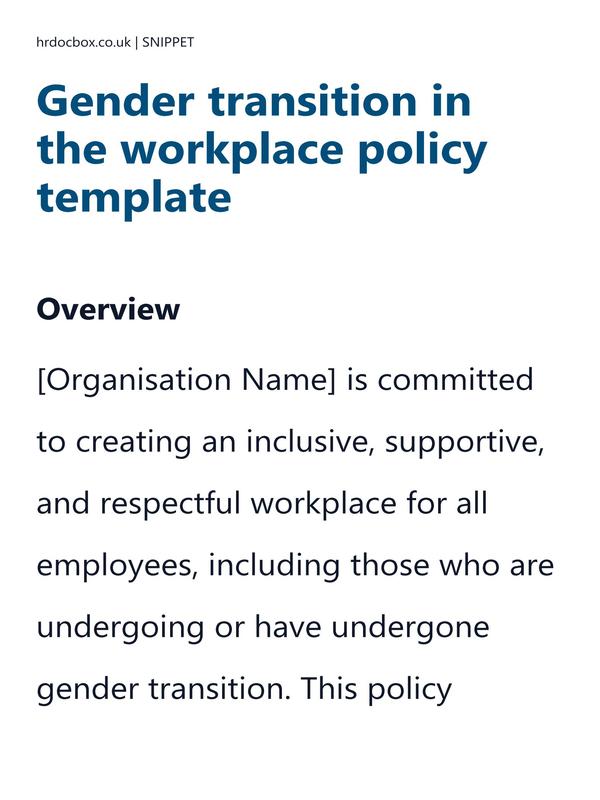Gender transition in the workplace policy template


Our gender transition in the workplace policy template equips you with a structured framework for effective use.
- Includes Gender transition in the workplace policy template, plus 12 months’ access with all updates provided free of charge and notified to you.
- UK-specific accuracy.
- 778 words over 3 pages.
- Last updated 25/10/2025.
- Format: Word / plain text / email.
- Delivery: Instant download after purchase (no physical item).
- Access: Download link shown here after checkout.
- This Gender transition in the workplace policy template will SAVE you up to 1 hour 30 mins drafting & research. Save cost. Reduce risk.
Gender transition in the workplace policy
1 Overview
1.1 [Organisation Name] is committed to creating an inclusive, supportive, and respectful workplace for all employees, including those who are undergoing or have undergone gender transition. This policy ensures that transgender and non-binary employees are treated fairly and equitably and that their dignity and privacy are protected at all times.
1.2 The purpose of this policy is to:
-
Support employees who are transitioning or exploring their gender identity.
-
Provide guidance for managers and colleagues on how to best support transitioning employees.
-
Establish procedures for ensuring a respectful, inclusive, and discrimination-free workplace.
2 Scope
2.1 This policy applies to all employees, including permanent, temporary, casual, and agency staff, as well as contractors and volunteers.
3 General Principles
3.1 Definitions
-
Transgender: An umbrella term for people whose gender identity differs from the sex assigned to them at birth.
-
Gender Transition: The process through which a person begins to live and identify as a different gender, which may involve social, legal, or medical steps.
-
Non-Binary: A term for people whose gender identity does not fit within the binary categories of male and female.
-
Deadnaming: Referring to a transgender person by their former name, which they no longer use.
3.2 Guidelines
-
Privacy and Confidentiality
-
Any information related to an employee’s gender identity or transition will be treated as confidential.
-
Disclosure of this
-
This is a 30% preview of the Gender transition in the workplace policy template. For instant full access, purchase this item or a parent bundle.
Gender transition in the workplace policy template purpose
This Gender transition in the workplace policy template aims to offer you a versatile and customisable tool, serving as a solid foundation for your needs. Utilise it to ensure consistency, enhance accuracy, and save valuable time.
Adapt it to suit your unique requirements, ensuring efficiency and effectiveness in your HR processes.
Practical application of a Gender transition in the workplace policy template
- Issue the Gender transition in the workplace policy template during onboarding / after changes / planned refresher.
- Send it to appropriate internal recipients such as employees, workers, contractors etc. and request confirmation that is has been read and understood.
Gender transition in the workplace workflow
Gender transition in the workplace workflow
Check which resources should be implemeted before and/or after the Gender transition in the workplace policy template, to understand the workflow.
Gender transition plan
Use this if you require a robust and practical Gender transition plan template.
Frequently Asked Questions about a Gender transition in the workplace policy template
Frequently Asked Questions about a Gender transition in the workplace policy template
-
Can I use the Gender transition in the workplace policy template in my small business?
Yes. The Gender transition in the workplace policy template is designed to be flexible and suitable for organisations of all sizes, including small businesses and charities. It follows UK employment law best practice, so even if you don't have an in-house HR team, you can confidently apply it.
-
Is the Gender transition in the workplace policy template compliant with 2026 UK employment law?
Absolutely. Like the Gender transition in the workplace policy template, all of our templates are drafted with the latest ACAS guidance and UK employment legislation in mind. We review and update them regularly, so you can be confident they remain compliant.
-
Can I customise the Gender transition in the workplace policy template for my organisation?
Yes, we highlight the areas of the Gender transition in the workplace policy template that you need to update with your own details, and where you need to make decisions to suit your situation. This saves you time and ensures that you meet best practice.
-
Do I get instant access to the Gender transition in the workplace policy template?
Yes. Once purchased, you'll be able to download the Gender transition in the workplace policy template instantly. Templates are provided in editable Word or Excel format so you can customise them easily, and in PDF format for easy sharing.
-
What if I need more help, not just a Gender transition in the workplace policy template?
If you're looking for broader support, we also offer toolkits and library bundles that include the Gender transition in the workplace policy template, along with other HR templates and policies for fully managing your situation. These may be more cost-effective if you need deeper advice.
-
Why should I use this Gender transition in the workplace policy template, and not AI to generate it?
The risk of using a free AI-generated template 'without review' includes your legal exposure, missing context, and no awareness of the wider process, whereas purchasing the Gender transition in the workplace policy template from us mitigates that risk.
